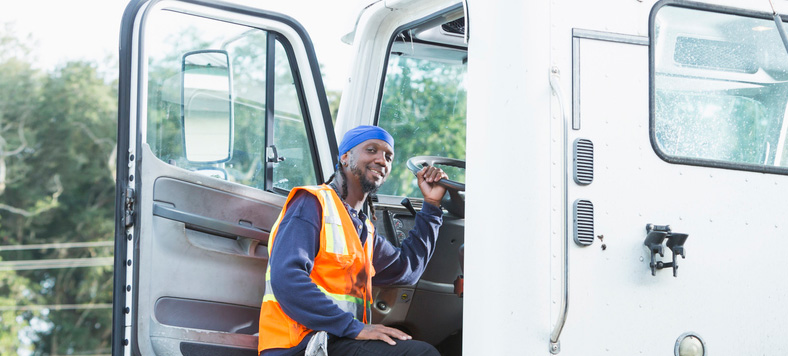Most everyone can agree that truck driving is, normally, a lonely profession. While driving teams, pairs of drivers working together on long hauls, are starting to become more prevalent, they are not an everyday occurrence yet. So, for the bulk of drivers, most of the time in the truck is spent alone. When Covid-19 hit four years ago, this known issue was greatly exacerbated when restaurants and truck stops closed; this was either voluntarily done by owners or by government order in some places. In many places, warehouses and shipping and receiving facilities barred truckers from entering due to fear of contagion. This meant that one of the loneliest jobs in the world became even more solitary. Over the next four years, bringing us to today, very few improvements have been made to make the lives of these men and women less lonely.
With an industry that is already short on drivers, and with more expected to retire and leave trucking, it is important that all new and current truckers feel as if they are important to their companies. Everyone wants to work for companies that have great benefits, and, more and more often, these benefits need to include healthcare that cares for both their physical and mental well-being. Truck drivers are not an exception to this rule, although they may not be prepared to admit that out loud. Today, we are going to discuss the difficulties drivers are facing maintaining their mental health on the road and what company management can do mitigate these pressures.
“All By Myself…”
We don’t need Eric Carmen to tell us that we don’t always want to be all by our lonesome selves. However, truck drivers spend long hours, days, and, sometimes, even weeks on the road; it is the nature of the industry, and most everyone that becomes a trucker does so understanding that being out driving for work is part of being in this field. Psychologists at the Missouri Psychological Association have determined that between 20-25% of truckers report having difficulties maintaining stress-free relationships with family and friends at home, at least partially due to the fact that they cannot be home as often as people in other fields can.
On top of being alone, drivers have to contend with mistreatment from a variety of sources. When not driving, truckers are not always treated well when picking up and delivering goods. Store and warehouse supervisors do not always take into account that traffic, weather, and a myriad of other issues can delay drivers, making them late with their shipments and creating mountains of stress for everyone. Sometimes, these warehouse workers and managers will take out their frustrations on drivers who have very little control on how delayed their pickups are. On the road, drivers in personal vehicles are constantly raising the stakes by not understanding how to share the road with truckers. While most people can count themselves lucky to have never been in or have seen a car accident, truckers, who are on the road all day long, are far more likely to be exposed to incidents that can be extremely traumatizing.
All of this together means that truck drivers are at risk for mental health issues, including depression, anxiety, post-traumatic stress disorder, suicidal thoughts, seasonal affective disorder, chronic fatigue, sleep disorders, and burnout. While all of these are serious and should be managed carefully, a few can be more severe.
Sleep Disorders
There are variety of sleep issues that drivers experience. While out on the road all day, many are sore from their sitting positions and have difficulty getting comfortable when it is time to go to sleep. Some drivers even skip out on sleep to make tight deadlines or pick up more loads for extra money. The group behind Truck Driver Rights states that the toll of missing enough sleep can cause symptoms like loss of concentration, irritability, and possibly even feed into depression. If nothing is done to take care of these issues, they can affect a truck driver’s performance on the road, which affects everyone’s safety.
Anxiety
Anxiety is normally found among newer truck drivers. The thought of taking a big rig out alone for the first time can be extremely daunting for them. With the difficulties of the industry, though, experienced truckers are just as susceptible to these worries. There are so many moving parts to keep track of, from road construction, to traffic, to severe weather, to the weight of the load being carried, to finding food and places to rest on the road, and many more obstacles and issues. It is not difficult to see why an anxiety disorder might show up in a truck driver.
Stress Disorders
Acute Stress Disorder has become more prevalent amongst drivers over the years. Industries that are short on employees are almost always more stressful. On top of that, the open road can be a dangerous place. Many drivers worry about being the victim of a crime when they stop. CDL Life conducted a survey and found that 21% of drivers have been victimized while on the job. From armed robbery to rape, 42% of those incidents were considered to be violent crimes.
Along with Acute Stress Disorder, rates of diagnosed Post-Traumatic Stress Disorder have gotten higher in the trucking industry. As stated above, some drivers are physically attacked on the road, causing PTSD that drivers will deal with for years afterward. Truckers are also on the front line of the fight against human trafficking, and sometimes they have found unspeakable horrors that will cause nightmares for them for years to come. Finally, deadly car accidents are witnessed by truckers, but they have to keep pushing forward to their destination.
According to the CDC, the transportation industry has the fourth highest suicide rate for men and women in an occupational group. It is not difficult to see why, but what can be trying is figuring out the best ways to help the drivers.
What can we do to help?
For many people, whether they are truckers or not, there is a stigma around talking about mental health. However, for truckers, who are still mostly men at this time, the industry is stereotyped as “macho,” and talking about such sensitive topics is seen as a weakness. Some drivers have turned to drugs or sex workers to fill the voids caused by loneliness, but there are healthy options to bring to them. Experts recommend that management lead the way when it comes to bringing mental health issues to the forefront, and evidence shows that trucking companies are starting to begin these tough conversations, therefore creating a culture of long term mental health improvements.
There are many ways to cope with mental health issues for most people, but truck drivers find that most of the normal options are unavailable to them due to the nature of their work. Therapy sessions are hard to schedule for someone who works out on the road for weeks at a time. As technology progresses, though, more workarounds are being found that can help drivers. Telehealth services have become more prevalent over the phone and through apps, and mental health services are slowly starting to become more available through those resources. It helps drivers out on the road to talk to someone. Some companies such as Paper Transport, which is one of the biggest carriers in the country, offer EAPs, or Employee Assistance Programs, to help truckers find and pay for mental health services. These programs are popular and should be introduced industry-wide for other truckers to take advantage of while they work on the road. Other experts have recommended adding more nurse practitioners and primary care clinics at truck stops, giving truck drivers the opportunity to at least speak to someone, in person, on a professional level.
Truck driver supervisors also need to be trained to recognize the signs of mental health issues. Communication between management and drivers is key to pinpointing who needs help and how to get it to them. Talking to drivers also cuts down on their isolation, creating environments where they feel less lonely. It shows them that they do not have to cope with their mental health on their own. Some experts will even say that peer-to-peer support, like communication between drivers or social media groups on YouTube, Facebook, and TikTok, can be extremely effective because then drivers learn ways to cope from other truckers who know exactly how they’re feeling. There are even calls to add more team drivers to the road; teams, such as spousal teams, can help overcome the stresses out on the road by simply adding another driver to the truck.
It is also important to remember that physical ailments can feed into mental ones. Include break times for drivers to get out of the truck, have a meal, and catch some sleep. Truckers who are taking care of their physical needs will also pay more attention and care to their mental needs. By continuing to offer incentives to exercise and stay physically healthy, trucking companies can help themselves stay on top of mental health issues.
Conclusion
There is more research to be done on the effects of truck driving on a trucker’s mental state. Studies are even currently being done on the effects on women, since male truck drivers have made up the bulk of previous research projects. It is important to study the effects of driving on both men and women, though. Truck drivers are the backbone of the American economy, but they have needs and ailments that require attention just like all other workers. In addition to making drivers feel valued, which aids in retention, truckers who maintain good mental health are extremely important to preserving their lives and the safety of others on the road.
____________________________________________________________________________
Meaghan Goldberg covers recruitment and digital marketing for Lionzone. A Patterson, GA native, after graduating from both Valdosta State University and Middle Tennessee State University, Meaghan joined Lionzone in 2018 as a digital recruitment strategist before becoming the social media manager.
Resources:
https://hub.jhu.edu/magazine/2019/fall/mona-shattell-long-haul-trucking-health/
https://www.transportdive.com/news/truck-driver-mental-health-pandemic/618424/
https://www.mem-ins.com/blog/mental-health-in-trucking-5-ways-to-support-stressed-drivers/
https://www.truckdriverrights.com/2020/08/26/a-lonely-road-examining-the-mental-toll-of-trucking/




